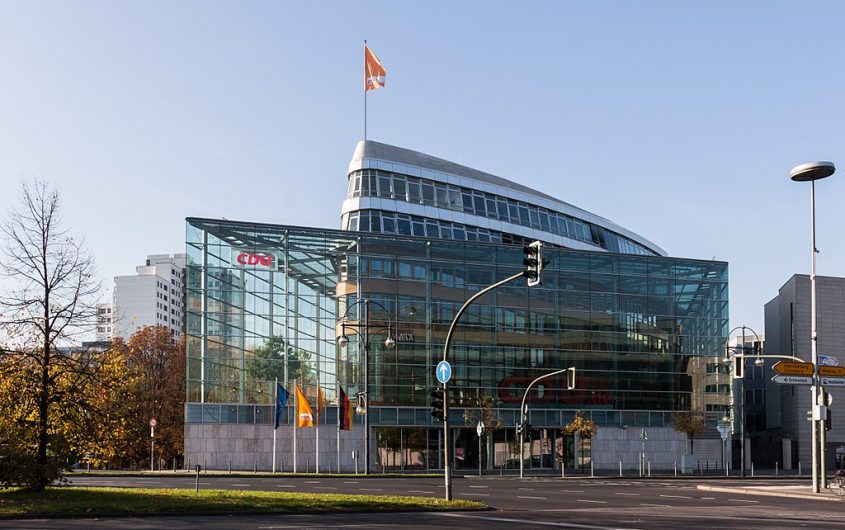
Ansgar Koreng via Wikimedia Commons
Quo Vadis CDU: Left, Middle, or Right?

Susanne Dieper
Director of Programs and Grants
Susanne Dieper is the Director of Programs and Grants at AICGS. She oversees the Institute’s programs and projects within the three AICGS program areas, manages all AICGS fellowships, and is in charge of grant writing. Her current focus is on issues related to transatlantic relations, immigration and integration, diversity, the next generation of leaders, workforce education, and reconciliation. She develops programs that align with the mission of AICGS to better understand the challenges and choices facing Germany and the United States in a broader global arena.
Previously, Ms. Dieper was in charge of organizational and project management at AICGS as well as human resource development and board of trustees relations. Prior to joining AICGS, she worked in transatlantic exchange programs, language acquisition, as well as the insurance industry in Germany.
Ms. Dieper holds an MBA from Johns Hopkins University with a concentration in International Business and an MA in English Linguistics and Literature, History, and Spanish from the University of Cologne. She has completed course work in nonprofit management at Johns Hopkins University.
__
When Annegret Kramp-Karrenbauer (AKK,) the CDU party leader and presumed successor to Angela Merkel as chancellor, announced her resignation from her role as CDU party chairwoman on February 8, 2020, speculation about who would come next began immediately and with much fervor within and outside of Germany. While many foreign leaders must have been secretly elated because of the near impossible task to pronounce AKK’s name, several members of her party with ambitions to replace her, including her 2018 rivals Friedrich Merz and Jens Spahn, must also have rejoiced at the news. Jens Spahn, Federal Minister of Health, decided not to compete again this time around but instead has joined forces with another new contender, Armin Laschet, Minister-President of North Rhine-Westphalia (NRW). Much to everyone’s surprise, Norbert Röttgen, CDU member of the Bundestag and chairman of the Bundestag’s Foreign Affairs Committee announced his candidacy on February 18, completing the trio of male contenders. Interestingly, all three hail from Germany’s largest state, North Rhine-Westphalia.
Not surprisingly, the initial excitement and speculation over who will be the next (male) chancellor of Germany have subsided amid the global COVID-19 pandemic. The candidates have been affected in various ways: Jens Spahn, as health minister, is at the helm of Germany’s efforts to slow and contain the virus; Armin Laschet’s home state recorded the first significant outbreak during the Karneval season and was challenged early on to confront the pandemic; Friedrich Merz tested positive for COVID-19 and is recovering at home; and Norbert Röttgen has updated his campaign slogan of “Jetzt Voran” (Now Forward) to “Jetzt Gesundheit. Voran Später.” (Now Health. Forward Later.) in consideration of the extraordinary challenges the country is facing at the moment. The special party convention at which the candidate was to be selected, originally scheduled for April 25, has been cancelled. A new date will be set after the crisis has been overcome. AKK remains CDU party chairwoman for now.
While there is certainly no official campaigning going on—the security and health of every citizen takes priority, according to the CDU leadership—the candidates presumably will continue to compete for the top CDU job after the crisis. Who are the men who want to succeed one of the longest serving chancellors of Germany and what do they stand for? They represent the full spectrum of political orientation within the CDU.
On the Left
A surprise candidate, and the first to declare his candidacy in 2020, Norbert Röttgen (54), is the most liberal of the group and has both foreign and environmental policy expertise. He currently chairs the Bundestag’s Foreign Affairs Committee and was Minister for the Environment, Nature Conservation, and Nuclear Safety between 2009 and 2012, when Chancellor Merkel fired him. In 2012 he had ambitions to become minister-president of North Rhine-Westphalia (the job his rival Armin Laschet now holds) but the CDU was soundly defeated by the SPD and its incumbent Hannelore Kraft at the time. His disinterest in staying in the opposition in NRW led to him losing the environment job in Berlin. Röttgen believes in a CDU as a party of the center that stands in stark contrast to both the far-right Alternative for Germany (AfD) and far-left Left Party. Communicating with the public about how politics can address crucial issues, in particular right-wing populism, public doubt about the euro, and the refugee crisis, as well as public fears in general, are of paramount importance in his view. He also emphasizes that the party must handle climate issues with actual conviction and has promised to do a lot more than the Merkel government has. Mostly, however, he is aligned with the chancellor on many issues and wants to work with her until parliamentary elections in September 2021. Röttgen also believes in Germany’s obligation to support and provide shelter to people who are fleeing persecution and violence. His policy toward refugees and asylum seekers will likely differ considerably from those of his rival Merz, who he has criticized for his lack of empathy concerning the recent migration situation on the Turkish and Greek border. Röttgen will surely be inclined to work closely with the Greens and enter into coalition discussions should he and the CDU get that far. He is situated farthest to the left of the three candidates and favors a woman in the role of deputy should he become party chairman.
In the Middle
Armin Laschet (59), Minister-President of NRW since 2017, announced his candidacy on February 25. In a surprise move, he will run as a team together with Jens Spahn, who would become his deputy at the helm of the CDU, and who has withdrawn from running himself. Spahn, who is far more conservative, would position Laschet well to gain traction with more conservative votes in an election. Laschet wants to unite his party and the country at the same time and believes in the benefits of a team and consensus-centered and balanced approach. He views the CDU as a party of the middle and, thus, distinguishes himself particularly from rival Friedrich Merz. He has proclaimed that personnel discussions have dominated the party’s dealings for too long and to its detriment. Team efforts within the party will correct this and reestablish the CDU as a party of the people (Volkspartei). One of his stated goals is to win back those voters who have turned to the Greens and to the SPD (at least in the Hamburg elections). Converting AfD voters appears less of a priority for him. The self-proclaimed Mann für den Ausgleich (the man in favor of balance) would mostly continue Chancellor Merkel’s political direction and apply a liberal, consensus-focused approach. His slogan is Maß und Mitte (Proportion and Middle).
On the Right
Friedrich Merz (64), a corporate lawyer, former member of the Bundestag and European Parliament, and former chair of the CDU/CSU in the Bundestag (2000-2002), narrowly lost the job to AKK in December 2018, and put his hat back in the ring on February 25. Merz is the most conservative of the current candidates and promises to take the CDU in a different direction. He believes in Aufbruch and Erneuerung (leaving the past behind and engaging in renewal or regeneration) of the party. He has been a vocal critic of the grand coalition of CDU and SPD and, specifically, the way the chancellor handled the refugee crisis in 2015. He continues to emphasize the importance of external borders and border control in the context of migration. He was also quick to criticize his rivals Laschet and Spahn for forming a “cartel” to influence the competition. Merz wants to correct all past mistakes of the party, particularly vis-à-vis migration and climate policies, and focus on the next generation, giving young and conservative voters a perspective and bringing back some voters who switched to the AfD. Should he become party chairman, a move to the right is all but certain. He also believes too much ground has been given to the Green party. Among the three candidates, Merz is the one who stands for the most significant change within the CDU. Not unlike Norbert Röttgen, Merz also envisions a far more prominent role for Germany on the global stage. Merz is in favor of a liberal economic policy and enjoys significant support from the private sector.
Who Will Win…and Does Anybody Care?
Several surveys asking which CDU/CSU chancellor candidate will most likely succeed in the next Bundestag election have put Merz at the top. According to the most recent survey conducted on March 11, 2020, by INSA for BILD, Friedrich Merz is the current frontrunner (with 29.1 percent of CDU/CSU voters) among the three, followed by Armin Laschet (25.3) and Norbert Röttgen (24.6). However, Markus Söder, Minister-President of Bavaria and CSU party leader in the same survey gained the most votes with 29.3 percent—a not-so-surprising development given Söder’s extraordinary efforts in his state to combat the COVID-19 crisis. He and Laschet clashed in the meeting of the state minister-presidents and Angela Merkel on March 22, over Söder’s unilateral measures to fight the pandemic. It may be a sign that Laschet takes this threat from the south seriously.
Söder might spoil the race in the end as CSU/CDU chancellor candidate, although Germany has never had a CSU chancellor. For now, however, nobody is concerned about who will become the future party-leader or chancellor. The CDU is gaining in popularity amid the COVID-19 crisis. According to Deutschlandtrend on March 20, the CDU has gained three percentage points and stands at 30 percent, followed by the Greens (23%), the SPD (14%), and the AfD (10%, a new low). The INSA-Meinungstrend (BILD-Wahlcheck) records an even better trend for the CDU with 33.5 percent on March 23. Angela Merkel continues to enjoy the confidence of the majority of Germans (53 percent are satisfied with her work), a close second is the Minister of Health, Jens Spahn. So why worry about who will follow?
Germans are increasingly concerned about their health in times of COVID-19 and their priority is to focus on the crisis. The government is handling the situation well or very well according to 65 percent of those surveyed on March 20. This bodes well for the future of the CDU and maybe even favors the continuation of Merkel’s politics—and therefore Armin Laschet and Jens Spahn, who also have impressed with their crisis leadership. When the CDU party delegates finally get to choose their next party leader and possible chancellor candidate, they will likely take the voters’ preferences and general mood across the country into consideration.








